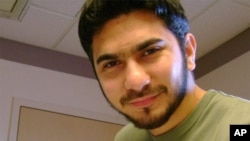The suspect in the abortive plot to set off a car bomb in New York City's bustling Times Square is reported to be readily cooperating with authorities. Meanwhile, top U.S. security officials, including the director of the CIA, went to Pakistan to press the government to follow up any investigative leads there.
U.S. officials accuse the Pakistani Taliban of being behind the Times Square plot. But officials have said little more about what Faisal Shahzad, the only person charged in the plot, has revealed, except that he is talking and admits to having received bombmaking training in Pakistan.
Professor Larry Goodson of the U.S. Army War College, an expert in Pakistani and Afghan affairs, says he is puzzled.
"You're going to send a guy to do the highest profile operation since 9-11, or at least since the London bombings, and you're going to send a rookie who can't keep his mouth shut? I don't know. It's just that there are a lot of things that just don't smell right about this and I can't - I don't quite know what's really going on," he said.
The Pakistani Taliban, or Tehrik-i-Taliban Pakistan, is not a single monolithic organization but more of an umbrella under which are gathered several different radical groups which share a common goal of opposition to the Pakistani state. Although separate from al-Qaida, analysts believe the Pakistani Taliban has gradually begun to share al-Qaida's goal of turning its sights on the United States.
Philip Mudd, former chief of the FBI's National Security Division, tells VOA that that pressure on the Pakistani Taliban from both the U.S. and Pakistan may have prompted them to start directly targeting the United States.
"So I suspect that in combination with the ideology they're picking up from al-Qaida, operationally they're feeling greater and greater pressure over the past year or two. And they're saying, the Americans are bringing it to us; we're going to bring it to them," he said.
Faisal Shahzad comes from a Pakistani military family. He studied in the United States, got a job as a financial analyst, and became a U.S. citizen last year. Somewhere along the line, he became radicalized and offered his services to the Pakistani Taliban.
But it raises the question of why they would trust a volunteer - a walk-in in intelligence jargon. Larry Goodson says he surely would have been under considerable Taliban suspicion as a possible American or Pakistani spy.
"If you came in telling me you wanted to do this and I was a big terrorist leader, I would really have to think that you were probably a double agent and that you were going to play me false," he said. And the last thing I think I would want to do is send you out as a lone wolf operative."
How much of a lone wolf Shahzad was is still not clear. So far no accomplices have been identified, at least publicly.
But Philip Mudd, who also served as an analyst at the CIA, says al-Qaida or the Taliban could give someone very rudimentary training without great security risk.
"The organization doesn't have to expose its innermost secrets to pull in somebody from New York and say, hey, here's how to hook up some propane tanks," he said. "So I think that given what we've seen in Western Europe in recent years and what we've seen in the United States, it's not surprising that they're bringing people in at relatively low levels, giving them some basic training, and saying, hey, go give it a shot."
Lisa Curtis of the Heritage Foundation says one possible alternative explanation for the Times Square plot is that it could have been some kind of test for Shahzad.
"So one of the theories out there is that he did come into contact with Pakistani Taliban or other militant groups, but he did not receive the full amount of training that they might give somebody that they had their full trust in. So perhaps they were seeing what he could do or what he was willing to do before they set him up for a perhaps bigger plot," said Lisa Curtis.
Explosives experts say the bomb left in the vehicle in Times Square was poorly designed and constructed, which is why it didn't go off. And, as Larry Goodson adds, Shahzad's attempted getaway was also amateurish.
"How could he have produced such a bad bomb and then furthermore, failed so egregiously in the getaway? I'm thinking that if I was going to do this mission, I'd be headed to the Mexican border by way of some vehicle, some car, on the back roads, using cash to pay for gas and what-have-you. I don't quite understand how one goes to the airport in New York and plans to fly to Dubai," said Goodson.
Shahzad did have plenty of cash that officials say he got through hawala, an informal system of transferring money that is in wide use throughout the Middle East and South Asia. Several people have been questioned in connection with the cash as investigators try to trace back the money trail.




